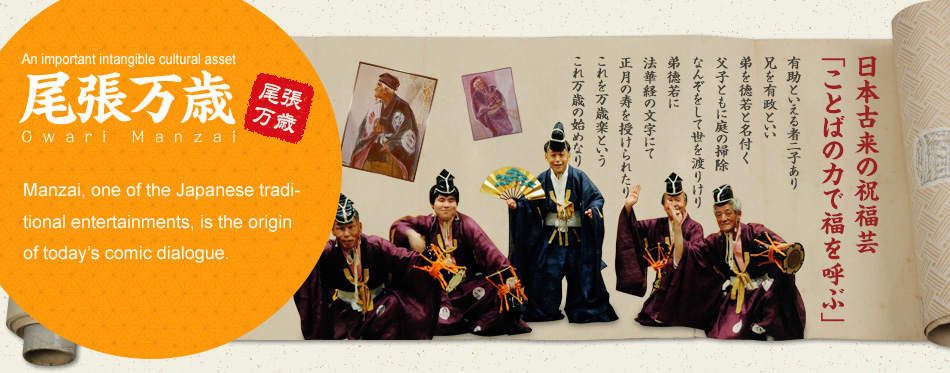The Origin
-
Manzai, one of the Japanese traditional entertainments, is the origin of today’s comic dialogue. It was used to celebrate new year days visiting each house, and to wish safety and prosperity for a family. It is said that Owari-Manzai of Chita region was originated in the Kamakura Era(1192-1333)
-

The Style
-
The original style of Manzai was played by two people as a group on the stage, one is called Tayu and the other is Saizo. On some stages, there would be two, four, or six Saizo instead of just one. Tayu plays his part with a fan in his hand, where Saizo plays with a drum. They sing a song sitting still, or stand up and dance. In Chita region, Manzai provided a job for farmers during their leisure season. There were two ways of showing the play, one is to play in a room of someone’s house, the other is to visit stranger’s front door and play.
-

Five kinds of Contents
-
There are five kinds of contents concerned different religions of each family. By the end of Edo Era, the contents of Manzai got funnier using characters of a crane and a turtle, which are the symbols of longevity, or the Seven Gods of Good Fortune, which bring wealth and health.
-

To Show Business
-
Late Edo Era, new style of Manzai called Sankyoku-Manzai was introduced. Sankyoku-Manzai imitated the contents of Kabuki, and was played with some instruments such as drum and syamisen. It became one of the show business in Meiji Era. By the time, Owari-Manzai became popular all over the country, and was enjoyed by the people and experienced its highest popularity After the Meiji Era, large number of Manzai players started traveling to Tokyo for side business. Soon, their income was concerned as taxable income and they had to pay one yen per month as tax.
-

To the West To the East.
-
Around 1892-93, when Tokai Rail Road started their operation, it is said that two hundred to three hundred Manzai players traveled by train. Nowadays, because of many changes of our lifestyle, less people play Manzai, however, it is still played for the preservation and the record of traditional Japanese entertainment on occasional events by the preservers.
-


